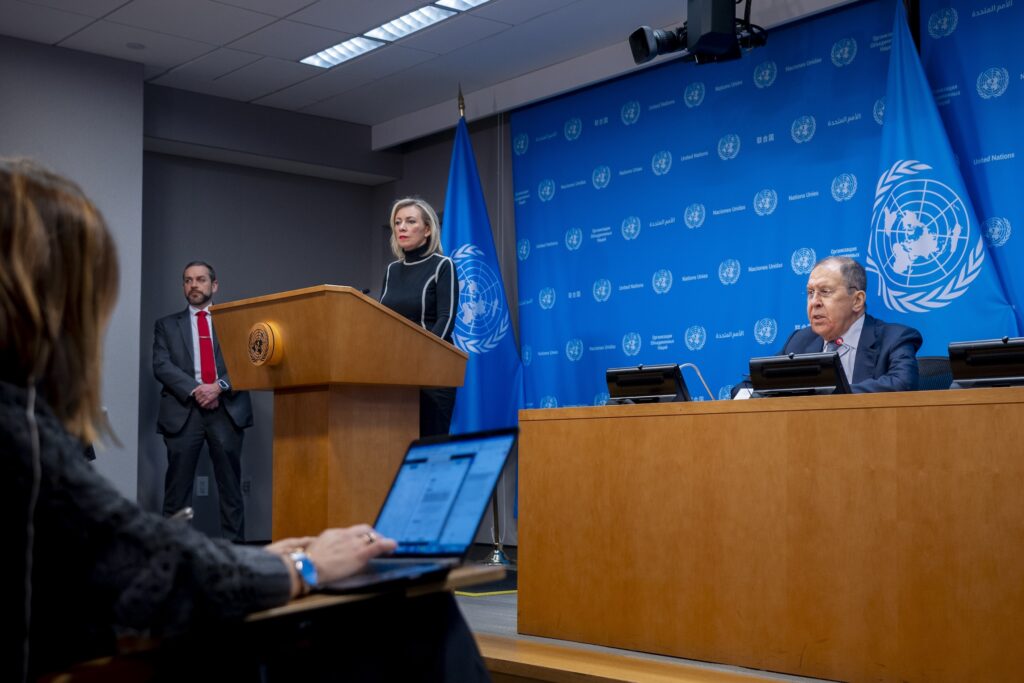Russian Foreign Minister Sergey Lavrov accused South Korea and the United States of “preparing for war” with North Korea in a show of Moscow’s sympathies with the truculent communist regime.
“We see that the DPRK is trying to be independent, not to dance to anybody’s tune,” Lavrov told reporters at the United Nations headquarters, using the acronym for the regime. “And we also see the U.S. bringing together a new military bloc, together with Japan and South Korea … They’re preparing for war with the DPRK.”
Those remarks offer diplomatic cover to North Korean dictator Kim Jong Un’s recent decision to abandon Pyongyang’s stated ideal of bringing the north and south into “one state with two systems.” Kim instead announced that South Korea will be treated as the “No. 1 hostile country and an unchanging main enemy” of his regime, a landmark overhaul of the dictatorship’s constitution that has caused alarm bells to ring in Seoul, Tokyo, and Washington.
“We are heading into a new period, and that period could be quite concerning,” Kurt Campbell, the lead White House official for the Indo-Pacific and President Joe Biden’s nominee to be the next secretary of state, told a Senate panel during his nomination hearing. “The steps that we have taken to date have been primarily to strengthen the regional deterrent around North Korea — what we have done with Japan and South Korea and other countries as well.”

That misgiving reflects diplomatic and military shifts in Pyongyang. North Korea fired “several cruise missiles” earlier Wednesday, according to South Korean officials. The missiles fell into the Yellow Sea, which is divided by a “limit line” between the two states that Kim declared “illicit and lawless” in a mid-January speech. North Korean officials also claimed to have tested an “underwater nuke-based” drone last week, roughly coinciding with a trip to Moscow by North Korean Foreign Minister Choe Son Hui.
“Our relationship with the DPRK is proceeding nicely,” Lavrov said Wednesday. “It’s developing quite actively.”
North Korea has emerged as a key supplier of artillery ammunition and short-range ballistic missiles for Russia to use against Ukraine. That partnership has stoked South Korean suspicions that Russia will compensate North Korea by improving Kim’s nuclear or missile arsenal, an ominous prospect given Japanese and South Korean anxiety that North Korea might take inspiration from Russia’s use of nuclear saber-rattling to deter Western intervention on behalf of Ukraine over the last two years of full-scale war.
“North Korea has defined the Republic of Korea as its principal enemy and has maintained a hostile policy under the goal of communizing the whole Korean Peninsula,” South Korean Defense Minister Shin Won-sik told a group of South Korean fighter pilots in a Wednesday meeting. “If the Kim Jong Un regime opts for the worst choice of waging war, you should be at the vanguard of removing the enemy’s leadership at the earliest possible time and put an end to the regime.”
North Korea’s recent pronouncements have sparked a debate in Western circles about whether the regime is embarking on a new strategy that leads toward war. Kim described the relationship with South Korea as “a relationship of two hostile countries, a complete relationship of two belligerents in the midst of war,” to the alarm of two longtime Korea watchers.
“The situation on the Korean Peninsula is more dangerous than it has been at any time since early June 1950,” Robert Carlin, a former senior official in the northeast Asia division of the State Department’s intelligence bureau, wrote in a 38 North op-ed with Siegfried Hecker. “If, as we suspect, Kim has convinced himself that after decades of trying, there is no way to engage the United States, his recent words and actions point toward the prospects of a military solution using that arsenal.”
That’s a minority viewpoint among Korea hands but still a striking one given Carlin’s longtime support for dialogue with Pyongyang. And even some analysts who espouse a different theory of North Korean strategy see a growing risk.
“I think North Korea is going to be increasing its rhetoric and its provocations, but it has not made the strategic decision to go to war,” the Heritage Foundation’s Bruce Klingner, a former senior CIA official for the Korean peninsula, told the Washington Examiner. “I think we’ll be operating within the range of its usual behavior, but at the very high end — with more of a potential for it boiling over, if inadvertently.”
CLICK HERE TO READ MORE FROM THE WASHINGTON EXAMINER
In any case, Kim could be emboldened by Russia’s backing for his diplomatic maneuvers and Moscow’s need for North Korean weapons.
“Now, it’s almost like Moscow is a supplicant, parroting Pyongyang’s talking points about South Korea, about the security situation in northeast Asia,” a former U.S. official who served in President Donald Trump’s administration said, referring to Lavrov’s remarks. “It’s actually quite a change from how Russia has talked about its relationship with North Korea.”

